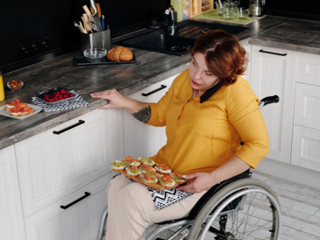
Yes, absolutely. Mortgage lenders cannot discriminate against you because of a disability – this covers all forms of disability, including physical and mental. Lenders should decide on your mortgage application as they would from anyone – based solely on your financial situation and ability to repay.
However, if you depend solely on benefits for your income you may find a mortgage more challenging to arrange because fewer providers will accept this as your only source of income. But this isn’t to say it’s impossible.
You can also get independent advice and help from a mortgage broker. They have an in-depth knowledge of the market and can advise you on the whole range of mortgage lenders and products that can help you most.
There are also Government schemes and independent organisations who can offer advice and even practical help.
Yes, there are mortgage lenders who are happy to consider applications if you are on state benefits. However, there are also providers that won't consider benefits as a form of income, only take into account a percentage of this income or only take these benefits into account if you are employed or retired.
With any mortgage application, the lender is primarily concerned that you can afford the repayments. All applicants – disabled or not – must pass strict affordability checks.
Affordability checks are designed to assess your ability to continue repaying your mortgage if circumstances were to change, such as interest rates rising. To find out more about these, take a look at our How much can I borrow for a mortgage calculator.
If you can pass these affordability tests, then there should be no problem with you obtaining a mortgage. However, you may have to shop around to find a lender who will consider a mortgage if your sole income is benefits-based. Here, it’s a good idea to use the services of a mortgage broker – these professionals know the mortgage marketplace and will know what lenders are open to applications from people on benefits. This can help you avoid wasting your time applying to mortgage lenders who aren’t suitable.
Whether you're a first time buyer, remortgage borrower, or home mover use our comparison charts to find the best mortgage deals on the market.
There are several Government benefits that some mortgage lenders will consider as part of your income when assessing the affordability of your application:
There are Government-funded schemes and independent organisations that can help disabled home-hunters, including:
Mortgage brokers remove a lot of the paperwork and hassle of getting a mortgage, as well as helping you access exclusive products and rates that aren’t available to the public. Mortgage brokers are regulated by the Financial Conduct Authority (FCA) and are required to pass specific qualifications before they can give you advice.
Get friendly, expert advice free of charge as a visitor of moneyfactscompare.co.uk.
Mortgage Advice Bureau have 1,600 UK advisers with 200 awards between them.
Speak to an expert mortgage broker today.
Call 0808 149 9177 or request a callback
Mortgage Advice Bureau offers fee free mortgage advice for Moneyfacts visitors that call on 0808 149 9177. If you contact Mortgage Advice Bureau outside of these channels you may incur a fee of up to 1%. Lines are open Monday to Friday 8am to 8pm and Saturday 9am to 1pm excluding bank holidays. Calls may be recorded.
Your home may be repossessed if you do not keep up repayments on your mortgage.
Disclaimer: This information is intended solely to provide guidance and is not financial advice. Moneyfacts will not be liable for any loss arising from your use or reliance on this information. If you are in any doubt, Moneyfacts recommends you obtain independent financial advice.